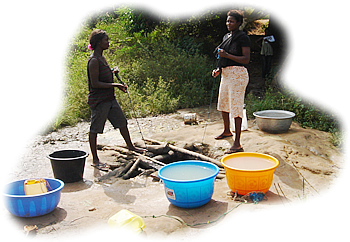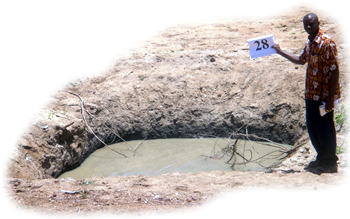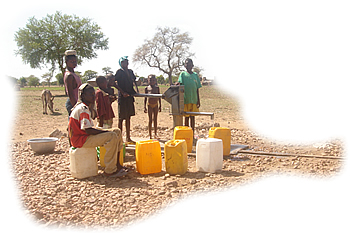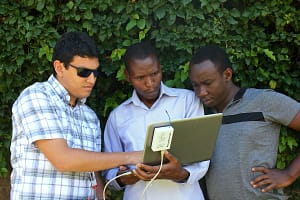BACKGROUND
 Groundwater is virtually ubiquitous and perennial in nature, and well suited to localized, small-scale development. Efforts to attain a Green Revolution in Africa, as has taken place in Asia and Latin America, are highly dependent upon groundwater-based initiatives since the spatial and temporal availability of surface water is highly constrained.
Groundwater is virtually ubiquitous and perennial in nature, and well suited to localized, small-scale development. Efforts to attain a Green Revolution in Africa, as has taken place in Asia and Latin America, are highly dependent upon groundwater-based initiatives since the spatial and temporal availability of surface water is highly constrained.OBJECTIVES
- Assessing groundwater availability and sustainability, including the impacts associated with its use and role in adapting to climate change
- Identifying opportunities and constraints in using groundwater, and provide advise to investors in groundwater interventions
- Developing a groundwater strategy for the region
PROJECT DESIGN
 A nested, multi-scale approach is being adopted involving analysis at three scales (SSA, national and local), in varying degrees of detail. At the SSA scale, broad-brush assessments that synthesize existing data for the 13 AGRA countries will be done (Burkina Faso, Mali, Ghana, Kenya, Malawi, Ethiopia, Mozambique, Niger, Nigeria, Rwanda, Tanzania, Uganda, and Zambia). More detailed investigations will be implemented in 4 focal countries: Mali & Ghana (West Africa) and Ethiopia & Tanzania (East/Southern Africa). Intensive field work and analysis is being conducted with local partner agencies within regions of the focal countries (Figure 1).
A nested, multi-scale approach is being adopted involving analysis at three scales (SSA, national and local), in varying degrees of detail. At the SSA scale, broad-brush assessments that synthesize existing data for the 13 AGRA countries will be done (Burkina Faso, Mali, Ghana, Kenya, Malawi, Ethiopia, Mozambique, Niger, Nigeria, Rwanda, Tanzania, Uganda, and Zambia). More detailed investigations will be implemented in 4 focal countries: Mali & Ghana (West Africa) and Ethiopia & Tanzania (East/Southern Africa). Intensive field work and analysis is being conducted with local partner agencies within regions of the focal countries (Figure 1).PROJECT IMPLEMENTATION
- Characterizing the quantity and quality of the groundwater resource and its constraints
- Understanding the target users and their behaviour
- Documenting the state of the art in promoting agricultural groundwater use
 Specific activities within these elements include:
Specific activities within these elements include:- detailed reviews of the groundwater conditions and the state of rural groundwater development within each AGRA country
- remote-sensing/GIS based mapping of groundwater ‘hotspots’ at the national scale for identification of areas with highest potential impact for groundwater development
- analysis of likely impacts of climate variability and climate change on groundwater availability
- environmental sustainability assessment of increased groundwater utilization in local study sites (one of these is the Upper East Region, Ghana)
- assessment of government policies relevant to groundwater resources development and management
- socioeconomic, gender and livelihood impact of present and potential groundwater use at different spatial scales
- summary of relevant lessons from South Asian experience in groundwater management
- evaluation of constraints and opportunities to groundwater development
- develop tools to assist groundwater developers / investors, in screening GDIs and designing intervention strategies
PROJECT CONTACT
PROJECT DURATION











